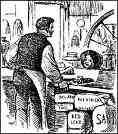Food fraud has been around a long time.
 A new paper in the current issue of the British Food Journal by Peter Shears (abstract below) reinforces the notion that with all the scientific developments and analytical techniques that seem so mind-bendingly sophisticated, there remains the basic problem of a lack of resources and that without a considerable increase in the resources made available for the appliance of the science currently available and that being developed, the battle against food fraud will never be fully engaged, yet alone won.
A new paper in the current issue of the British Food Journal by Peter Shears (abstract below) reinforces the notion that with all the scientific developments and analytical techniques that seem so mind-bendingly sophisticated, there remains the basic problem of a lack of resources and that without a considerable increase in the resources made available for the appliance of the science currently available and that being developed, the battle against food fraud will never be fully engaged, yet alone won.
As today’s society grapples with how best to validate that food is indeed what it says it is — and safe — and as the huskers and buskers emerge with cure-alls, I turn to the words of Madeleine Ferrières a professor of social history at the University of Avignon, France, in Sacred Cow, Mad Cow: A History of Food Fears, first published in French in 2002, but translated into English in 2006:
"All human beings before us questioned the contents of their plates. … And we are often too blinded by this amnesia to view our present food situation clearly. This amnesia is very convenient. It allows us to reinvent the past and construct a complaisant, retrospective mythology."
Ferrières provides extensive documentation of the rules, regulations and penalties that emerged in the Mediterranean between the 12th and 16th centuries. Shears reviews current efforts in his new paper. But rules are only as good as the enforcement that backs them up.
Food fraud – a current issue but an old problem
30.jan.10
British Food Journal, Year 2010, Volume 112, Issue 2, Page 198 – 213
Peter Shears
http://www.emeraldinsight.com/Insight/viewContentItem.do;jsessionid=9912FEB61D0FDD96E3A0E8D64EA89F2A?contentType=Article&contentId=1838362
Abstract:
Purpose – The purpose of this paper is to address the topic of food fraud which has been so widely and variously reported over recent months and years. Its purposes are to set current experience into an historical context and to illustrate the tension between the science of deception and the science of detection.
Design/methodology/approach – This is a desk study of published literature and historical documentation, together with interviews with those professionally concerned with detection and enforcement.
Findings – The piece concludes that with all the scientific developments and analytical techniques that seem so mind-bendingly sophisticated, there remains the basic problem of a lack of resources.
Practical implications – It is asserted that more is owed to the memories and the reputations of those who pioneered the effort to combat food fraud. Without a considerable increase in the resources made available for the appliance of the science currently available and that being developed, the battle will never be fully engaged, yet alone won.
Originality/value – This review is unique in that it seeks to take a long view of current concern, and even scandal, showing that the situation is not new and lessons should have been learned from past experience.
